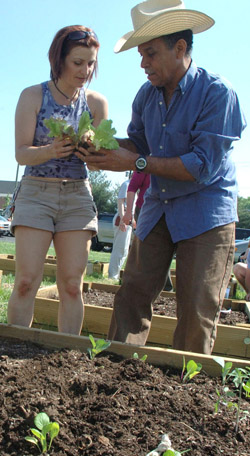Tyrone N. Butts
APE Reporter
52
Learning language, happy to be here, 'to save our lives'
Fatuma Adan and her husband, Musa Matan, were farmers in Somalia until war and ethnic strife caused them to flee. They went to Kenya, where they stayed in refugee camps for several years before coming to Nashville about seven months ago.
''We come to save our lives,'' said Musa through a Somali interpreter named Alrahim Abdi, who arrived in the United States just a couple of weeks ago. Abdi learned English while in the refugee camps, where he spent the majority of his 20 yea
s.
Fatuma and Musa are learning English a little bit at a time at the Village West apartments. The instructors can't speak the couple's native Maymay, but they teach the refugees simpl
e t
ings such as colors, numbers and short greetings with t
he help of gestures and pictures.
And while Musa, 66, gets some medical help for his high blood pressure, Fatuma, 46, works cleaning up at Cafe Coco off Nashville's Elliston Place during an early morning shift.
They seem happy to be here, although they remain somewhat baffled by so many neighbors speaking so many languages. Musa said they all just exchange hellos and how-are-yous and say they are fine in what for many is newly acquired English.
As for her new life, Fatuma said through the interpreter, ''It is good here. "â┚¬Ã…¡ÃƒÆ’”�šÃ”š¦ Since I came here I saw another life.''
But they wonder what has happened to their old friends and their farm. Fatuma said, ''What is behind, I don't know.'' <b
r>
****************
We don't use n-ggers to pick cotton anymore. Go back to Afreaka!
T.N.B.
Learning language, happy to be here, 'to save our lives'
Fatuma Adan and her husband, Musa Matan, were farmers in Somalia until war and ethnic strife caused them to flee. They went to Kenya, where they stayed in refugee camps for several years before coming to Nashville about seven months ago.
''We come to save our lives,'' said Musa through a Somali interpreter named Alrahim Abdi, who arrived in the United States just a couple of weeks ago. Abdi learned English while in the refugee camps, where he spent the majority of his 20 yea
s.
Fatuma and Musa are learning English a little bit at a time at the Village West apartments. The instructors can't speak the couple's native Maymay, but they teach the refugees simpl
e t
ings such as colors, numbers and short greetings with t
he help of gestures and pictures.
And while Musa, 66, gets some medical help for his high blood pressure, Fatuma, 46, works cleaning up at Cafe Coco off Nashville's Elliston Place during an early morning shift.
They seem happy to be here, although they remain somewhat baffled by so many neighbors speaking so many languages. Musa said they all just exchange hellos and how-are-yous and say they are fine in what for many is newly acquired English.
As for her new life, Fatuma said through the interpreter, ''It is good here. "â┚¬Ã…¡ÃƒÆ’”�šÃ”š¦ Since I came here I saw another life.''
But they wonder what has happened to their old friends and their farm. Fatuma said, ''What is behind, I don't know.'' <b
r>
****************
We don't use n-ggers to pick cotton anymore. Go back to Afreaka!
T.N.B.

